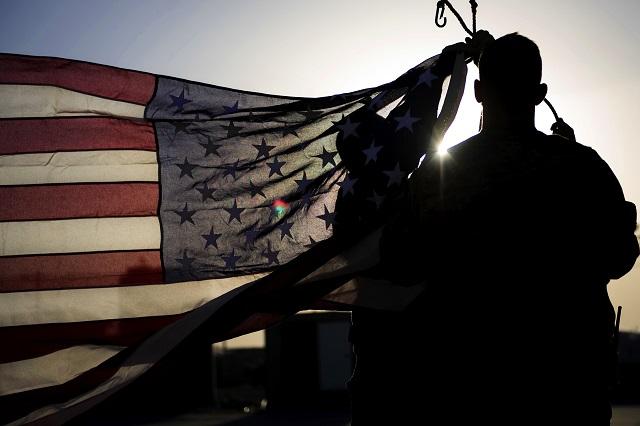Afghanistan: Obama’s last and reluctant troop decision
Posted By Claude Rakisits on July 8, 2016 @ 11:00

President Obama, flanked by his Secretary of Defense—Ashton Carter—and the Chairman of the Joint Chiefs of Staff—General Joseph F. Dunford, Jr.—announced [1] at the White House on Wednesday 6 July his latest—and last—troop adjustment for Afghanistan.
According to the last troop adjustment [2] in October 2015, the US planned to keep 9,800 troops in Afghanistan until the end of 2016, with that number to be reduced to 5,500 in January 2017. However, in light of the events on the ground—where the ‘security situation remains precarious’, Obama has announced that the troop level would be kept at 8,400 until the end of his presidential term in late January 2017.
It was widely expected that the Obama administration would re-adjust upwards the number of troops to stay in 2017. During his Senate confirmation [3] hearing in January 2016 as President Obama’s nominee to become the new commander of US forces in Afghanistan, Lieutenant-General John Nicholson made it clear that the situation in the country could get worse if Washington drew down its forces too soon. President Obama confirmed that General Nicholson’s recent confidential assessment of the situation in Afghanistan played an important part in his decision to again adjust the troop level.
The US troops in Afghanistan would continue the dual role they’ve played since the major military withdrawal in December 2014; that is, training and advising the 350,000-strong Afghan security forces and supporting counterterrorism operations against al-Qaeda and other terrorist groups. These US troops would be topped up by another 6,000 troops as part of NATO’s Resolute Support mission. Those troop levels will be confirmed at NATO’s meeting in Warsaw [4] this week, which President Obama will be attending.
At the NATO meeting, the US and its allies will try to raise US$15 billion [5] to fund the Afghan security forces until 2020. However, the US Special Representative for Afghanistan and Pakistan—Ambassador Richard Olson—noted in a recent address [6] to the Washington-based Atlantic Council that NATO members couldn’t be expected to fund Afghan’s security forces indefinitely.
Accordingly, Ambassador Olson stressed that, because there was no military solution to the present conflict, it was important to get the reconciliation talks off the ground. He believed that the format established by the Quadrilateral Coordination Group—the US, China, Pakistan and Afghanistan—was the most promising and useful framework to reach a peaceful political solution. And President Obama stressed during his address [1] that there would only be a total drawdown of foreign troops after a final and permanent political agreement is reached between the government of Afghanistan and the Taliban. Unfortunately, the Taliban has shown no interest [7] in participating in peace talks.
Notwithstanding the spin the Obama administration puts on how much has been achieved in Afghanistan over the last 15 years, the bottom line is that the Taliban hasn’t been defeated militarily. And that’s not looking likely as long as they have safe havens across the border in Pakistan. Accordingly, the Taliban has little incentive to enter into peace talks.
Clearly referring to Pakistan, President Obama reiterated the importance of Afghanistan’s neighbours to not provide safe havens to the Taliban. That not-so-subtle reference to Islamabad is now much more powerful given the recent elimination of the Taliban leader [8], Mullah Mansour, in an American drone strike in Pakistan’s Baluchistan province. That successful attack made it clear that Taliban leaders could no longer count on the safety of Pakistan. That option has now been closed off.
Ambassador Olson also reaffirmed the importance of having Pakistan hunt down the Taliban in its tribal areas if peace is to be achieved in Afghanistan. And while Pakistan has publicly declared that it’s committed to peace talks [9], it’s unclear how much pressure it’s willing to put on the Taliban, especially after the recent drone attack which upset the Pakistani military leaders.
Watching President Obama deliver his statement, it was obvious to all that he would have preferred sticking to his original troop level . When he came to office in 2009, he made it clear that his priority was to get all US troops out of Afghanistan and Iraq, regardless of the conditions on the ground. Unfortunately the withdrawal from Iraq hasn’t brought peace to the country; quite the contrary, it’s now falling apart. In Afghanistan, while the Taliban aren’t about to march into Kabul and the threat from militants loyal to the Islamic State remains low at present, President Obama wouldn’t want to be remembered for having seen the collapse of that country as well under his watch.
So while the number of troops remaining in Afghanistan may be low, their presence will nevertheless demonstrate America’s—and other countries’—commitment to the security of Afghanistan, at least symbolically. According to President Obama, this latest troop level will give the next president a solid foundation to address the security situation in Afghanistan. Maybe, maybe not. But what’s certain is that this issue will be one of the first problems sitting in the next president’s to-do-box—and it’ll require immediate attention.
Article printed from The Strategist: https://aspistrategist.ru
URL to article: /afghanistan-obamas-last-reluctant-troop-decision/
URLs in this post:
[1] announced: http://www.c-span.org/video/?412304-1/president-obama-drops-plan-reduce-troop-levels-afghanistan&live&gclid=CP69xpaa380CFcNehgodpWMGzw
[2] last troop adjustment: http://www.militarytimes.com/story/military/2015/10/15/obama-extends-afghanistan-mission-into-2017-troops-surge/73981218/
[3] confirmation: http://www.c-span.org/video/?403828-1/lieutenant-general-john-nicholson-confirmation-hearing
[4] NATO’s meeting in Warsaw: http://www.nato.int/cps/en/natohq/news_133063.htm
[5] raise US$15 billion: https://www.washingtonpost.com/world/the-us-will-be-seeking-billions-more-from-other-countries-to-help-support-afghanistan-efforts/2016/06/17/3b6bb0b8-2f3d-11e6-b9d5-3c3063f8332c_story.html
[6] recent address: http://www.atlanticcouncil.org/events/past-events/international-commitment-to-afghanistan-a-conversation-with-srap-ambassador-richard-olson
[7] shown no interest: http://www.nytimes.com/2016/03/06/world/asia/taliban-say-they-wont-attend-peace-talks-but-officials-arent-convinced.html?_r=0
[8] recent elimination of the Taliban leader: https://aspistrategist.ru/fallout-assassination-mullah-mansour/
[9] committed to peace talks: http://www.dawn.com/news/1189596
Click here to print.